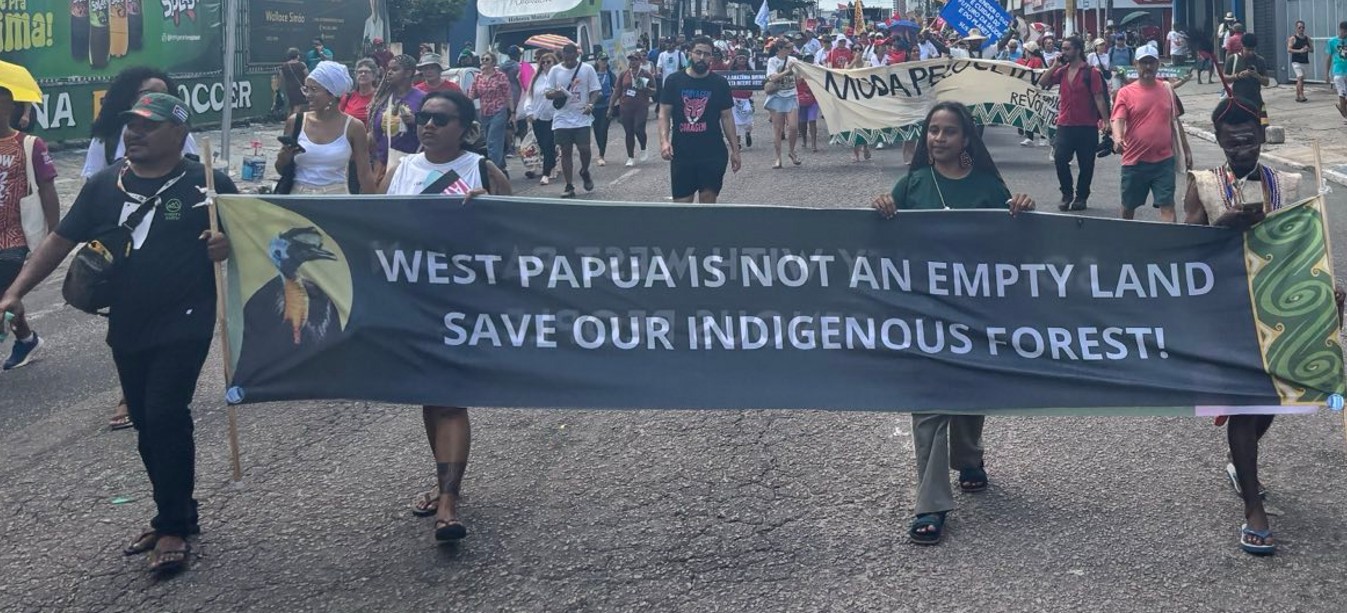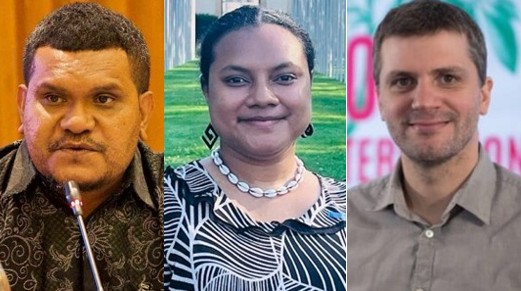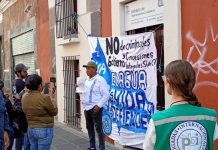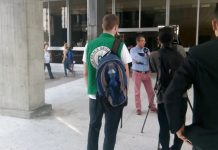On Tuesday November 18, PBI-Canada hosted a webinar that featured Indigenous West Papuan environmental defenders Dina Danomira and Teddy Wakum along with Global Witness policy advisor Javier Garate.
They offered their insights about COP30 in Belém, Brazil in a discussion with PBI-Canada coordinator Brent Patterson in Ottawa and an audience of 100+ people listening in from Canada, the United States, the Netherlands, Germany, France, Norway, the United Kingdom, Honduras, Indonesia, Fiji, Rwanda, Morocco and New Zealand.
Just a few days prior, on Saturday November 15, Dina, Teddy and Javier participated – with 70,000 people – in the Great People’s March.

Dina Danomira
During the webinar, Danomira highlighted: “Not many people know that West Papua has the third largest rainforest in the world after Amazon and Congo. It is very important for us to increase our international solidarity and raise awareness about environmental destruction and human rights abuses in West Papua.”
The Guardian has also explained: “West Papua is the western half of the island of New Guinea, home to the world’s third-largest rainforest. It is rich in natural resources, including the world’s largest gold and copper mine, as well as extensive reserves of natural gas, minerals and timber. …West Papua, which has been under Indonesian control since 1963 [is] where thousands of acres of rainforest are being cleared for agriculture.”
That industrial agriculture includes sugar cane, palm oil and bioethanol production for export. (It remains to be seen how this will be impacted by the new Canada-Indonesia Comprehensive Economic Partnership Agreement announced by Canadian prime minister Mark Carney in September 2025.)
Teddy Wakum
Wakum further noted: “We are here to highlight the issue of Indigenous people and the other issue of human rights violations. In West Papua, in Merauke, we are concerned on the ground about the Indonesia policy that plans to take two million hectares of land.”
In September 2024, Mongabay reported: “A total of 2 million hectares (5 million acres) of forests, wetlands and grasslands in Merauke district will be razed to make way for a cluster of giant sugarcane plantations, part of the Indonesian government’s efforts to boost domestic sugar production. Five consortiums, consisting of Indonesian and foreign companies [including PT Global Papua Abadi], are confirmed to be participating in the 130 trillion rupiah ($8.4 billion) project, with roles ranging from developing sugarcane plantations and processing mills, to building the power plants to run them.”
Mongabay has also reported that Wakum, a lawyer and the director of the Merauke Legal Aid Institute (LBH), is providing legal assistance to many of the Indigenous communities affected by the food estate project.
Javier Garate
And Garate shared: “The Defenders Team at Global Witness has supported the COP do Povo or the People’s COP where there is a wall that the friends did with all the names of every person, every land and environmental defender, that we as Global Witness has documented who have been killed since 2012.”

In September 2025, Global Witness published its annual report on land and environmental defenders, titled Roots of Resistance, that showed that the total number of defenders killed or disappeared from 2012 to 2024 now comes to at least 2,253 people.
That list includes the names of 25 land and environmental defenders killed in Indonesia during that period. Global Witness notes that those killed in 2024 include:

Petition to stop PSN Merauke
At the conclusion of the webinar, Danomira stated: “For us, as West Papuan, we need all the international solidarity that we can get. So, as simple as mentioning West Papua in any action, in any protest, in any intervention, is very powerful for us. Our case is the same as in the Amazon and Congo, and even in conflict areas like Palestine, West Papua is experiencing a lot of that too.”
The Guardian has reported: “West Papuans say more than 500,000 of their people have been killed by the occupation in the past six decades, while millions of acres of their ancestral lands have been destroyed for corporate profit.”
That article adds that the United Liberation Movement for West Papua (ULMWP) describes this repression as a “hidden genocide”.
Danomira highlighted: “I would like to put in a petition that is ongoing which is part of a court case that they are bringing to the National Constitutional Court about the issue of the National Strategic Project in the whole Indonesia. If everyone could just help and sign the petition we are trying to send that to the President to stop this project.”
The petition – Land Grabbing and Deforestation Is the Biggest Deforestation, President Prabowo Stops PSN Merauke! – can be found here.

Earlier this year, Mongabay also explained: “Hundreds of Indigenous people and civil society groups in Indonesia are demanding an end to government projects that have seized their lands, fueled violence, and stripped them of their rights. …[They oppose the] displacement and suffering caused by …projects classified as being of strategic national importance, or PSN… which include roads, dams, power plants, industrial estates and plantations.”
That article notes that “priority projects” with the PSN designation are fast-tracked “often at the cost of people’s rights and environmental and social impacts.”
Defenders under threat
On the same day as the webinar, UN Special Rapporteurs Mary Lawlor, Michel Forst, Elisa Morgera and others highlighted: “The protection of Indigenous Peoples’ human rights is essential, as they are facing widespread violations not only because of the continued expansion of fossil fuels in their territories, but also just transition projects, mining and carbon credits that do not respect their rights or harm biodiversity, water, food and health. Indigenous Peoples seek to be heard and ask that solutions affecting them are co-developed with them.”
Also on the same day as the webinar, Morgera, the UN Special Rapporteur on human rights and climate change, further wrote: “At COP30, the international community must recognize that protecting human rights defenders – and co-developing climate solutions with them – is central to delivering on the Paris Agreement. …Protection of defenders and co-development of renewables and transition minerals projects must become a condition for climate finance, not an afterthought.”
UNEA-7 in Kenya, COP31 in Turkiye
Morgera further noted: “Beyond COP30, the UN Environmental Assembly in December could be another opportunity to take these points forward.”
The seventh session of the United Nations Environment Assembly (UNEA-7) will take place from December 8–12, 2025, in Nairobi, Kenya.
It is now known that COP31, briefly discussed during the PBI-Canada webinar, will take place in Antalya, Turkiye in November 2026.
We continue to follow this.
Previous reading: Register now for PBI-Canada webinar on COP30 and West Papuan Indigenous human rights defenders (November 14, 2025)

Additional reading: Canada signs Declaration at COP30 that commits to proactive policies for the safety of environmental journalists and defenders (November 20, 2025).





